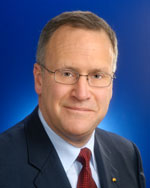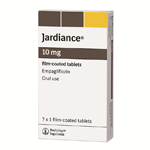 |
| Eli Lilly CEO John Lechleiter |
It looked like Eli Lilly ($LLY) had nowhere to go but up at the beginning of this year after patent expirations for big sellers Cymbalta and Evista had taken a bite out of revenues and sent earnings spiraling downward. CEO John Lechleiter promised that key meds would help lift the company out of its sales funk, and at least in Q3, the helmsman's pledge rang true.
The company today posted numbers that beat the Street's expectations on some measures, including promising sales for diabetes drugs and better-than-expected performances for older products.
Lilly grew sales by 2% to $4.96 billion for the quarter, which fell slightly short of analysts' predictions of $4.983 billion. The Indianapolis, IN-based company's non-GAAP EPS rang in at $0.89, though, exceeding expectations of $0.76. Lilly can partly thank cost cuts for that number, as the drugmaker's previous efforts show positive results.
Lilly's Type 2 diabetes med Trulicity hit its mark, bringing in $74 million in sales for the quarter and exceeding analysts' estimates of $66 million. The company's bestselling Humalog had $705 million in sales, beating the consensus of $703 million.
Older meds such as schizophrenia drug Zyprexa and antidepressant Cymbalta also delivered. Zyprexa posted $238 million in revenues, handily surpassing the Street's consensus of $207 million. Cymbalta brought in $243 million in sales, beating analysts' predictions of $238 million.
But Lilly's Alimta stumbled during the quarter, with sales of $629 million that fell short of the Street's prediction of $670 million. The drug especially took a beating in the U.S., with $297 million in sales that missed analysts' consensus of $325 million as "competitive pressures and customer buying patterns" took their toll, Evercore ISI analyst Mark Schoenebaum said in note to investors. Still, Lilly got some reprieve in August after a federal court granted the company 5 more years of U.S. exclusivity for Alimta, barring copycats from Teva Pharmaceutical Industries ($TEVA).

Lilly and Boehringer Ingelheim's diabetes powerhouse Jardiance also came in weaker than consensus, which could be attributed to a slowdown in new patient starts for SGLT2 meds in Q2, Schoenebaum said. But Lilly and Boehringer are working hard to set their drug apart, recently revealing trial results showing that the med cut the risk of heart attack, stroke and death from cardiovascular causes by 14% in high-risk Type 2 diabetes patients--data that "are pretty remarkable at first blush," Schoenebaum said at the time.
Lilly is expecting bigger things in the months ahead. The drugmaker upped its 2015 forecast to $3.40 to $3.45 a share from $3.20 to $3.30 a share, putting its faith in recent launches and pipeline developments to generate growth. The company recently won FDA approval for its Type 2 diabetes med Synjardy and chalked up promising data in a Phase III study of its RA candidate baricitinib, softening the blow in light of Lilly's abandoned Phase III trials for its cardiovascular med evacetrapib.
"We are pleased with our strong third-quarter results, which reflect the ongoing actions we are taking to grow revenue and increase productivity while we are replenishing and advancing our pipeline with an array of new, innovative therapies," Lechleiter said in a statement.
- read Lilly's earnings statement
Special Report: The top 15 pharma companies by 2014 revenue - Eli Lilly